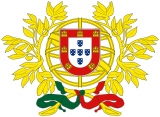Government of Portugal
 |
|---|
| Constitution |
The Government of Portugal is one of the four sovereignty bodies of the Portuguese Republic, together with the President of the Republic, the Assembly of the Republic and the courts. It is both the body of sovereignty that conducts the general politics of the country and the superior body of the Portuguese public administration. It is referred as the Government of the Portuguese Republic, as the Government of Portugal or simply as the Government.
Composition
The Government comprises the Prime Minister, deputy prime ministers, ministers, secretaries of State (junior ministers) and under-secretaries of State. Each minister usually heads a ministry and has assigned to him or her one or more secretaries of state.
Formation
After the elections for the Assembly of the Republic or the resignation of the previous government, the President listens to the parties in the Assembly of the Republic and invites someone to form a government.
The Prime Minister chooses the persons that he or she finds fit. Then the President swears in the Prime Minister and the Government.
Functions
The government has political, legislative and administrative functions. These include, among other things, the power to negotiate with other countries or international organizations, to submit bills to the Assembly of the Republic, to issue decrees and to take administrative choices
The government guides its actions by the governmental program and implements it in the government budget that is submitted to Assembly of the Republic each year, in the laws that it proposes, in the decrees that it issues in the Portuguese Council of Ministers, and in individual decisions made by its members.
There are no guarantees that the government will stick to its government program, but if it fails to do so, its actions will be judged by the citizens in forthcoming elections.
The government may also be questioned by the other three sovereignty organs: the President of the Republic, the Assembly of the Republic and the courts. The President may veto governmental decrees and a government bill may fail to pass in the Assembly of the Republic, where a motion of no confidence may be approved.
List of governments (since 1976)
- I (1976–78)
- II (1978)
- III (1978)
- IV (1978–79)
- V (1979–80)
- VI (1980–81)
- VII (1981)
- VIII (1981–83)
- IX (1983–85)
- X (1985–87)
- XI (1987–91)
- XII (1991–95)
- XIII (1995–99)
- XIV (1999–2002)
- XV (2002–04)
- XVI (2004–05)
- XVII (2005–09)
- XVIII (2009–11)
- XIX (2011–Present)

